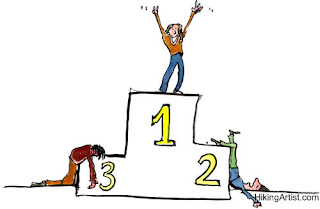The blog for editorial consideration of topics from "a" to "z" to stimulate your further investigation and to draw your comments.
Sunday, July 25, 2010
I Won! I Won!
Some claim that winning is the only dutiful outcome. I would contend that such victory is not always possible and not always a measurable goal of success for any event, cause, or movement.
If winning was the ultimate goal in important historical struggles in places such as Korea, why was the Koran War never fought to conclusion but ended in armistice in 1953 that allowed continuing struggles with a sabre-rattling, nuclear-endowed dictator who sits above the 38th parallel? If winning were paramount in achievement and commitment to involvement, what legacy is left from the loss of the valiant struggle to free South Vietnam?
And, if victory is the only acceptable consequence, why does the Federal government largely overlook its major role and offer inadequate support in horrendous situations that weaken human rights and human conditions such as poverty, illegal immigration, inalienable rights, and drug abuse?
"The struggle alone pleases us, not the victory." --Blaise Pascal (1623-1662)
Blaise Pascal (famous scientist mathematician, and philosopher) contended that if people actually took survey of themselves, they would be terrified to find that their material being, given by nature, is between "two abysses of the infinite and nothing." This revelation could be a frightening view for anyone.
Pascal viewed man in nature as the following: "A nothing in regard to the infinite, a whole in regard to nothing, a mean between nothing and the whole; infinitely moved from understanding either extreme. The end of things and their beginnings are invincibly hidden from him in impenetrable secrecy, he is equally incapable of seeing the nothing whence he was taken, and the infinite in which he is engulfed."
Pascal was a devoutly religious man who had gone through a an intense religious experience which brought him total conviction (of a kind inaccessible to the rational intellect alone) of God's reality and presence.This conversion, as well as his realization of the human struggle with the infinite and the finite, led him to believe that reason alone is unable to bring one to God. Pascal believed that only God holds the power to deliver the human being into the hand of the divine. People, like it or not, are amidst the ever-present struggles of their earthly domain.
"The heart has its reasons of which reason knows nothing. It is the heart which perceives God and not the reason. That is what faith is: God perceived by the heart, not by the reason." --Blaise Pascal
Having found himself in a world of fragile nature in many social relationships, a world often filled with unsatisfactory legal and political concepts, he held social hierarchy to be based on arbitrariness rather than justice. As with his moral and social being, man's metaphysical nature added to this dissatisfaction. Pascal contended that "man is a unique creature, but condemned to die in an infinite, impersonal universe." Although not a rosy, totally optimistic philosophy, Pascal's view confirmed many realistic frailties.
Finding himself unable to experience a complete temporal (worldly) victory, Pascal immersed himself in the worthy struggles of a useful, temporary life on earth. Pascal recognized that man could not arrive at all knowledge by his own wisdom. He wrote that "Faith tells us what the senses cannot, but it is not contradictory to their findings." And, despite a short life with constant sickness and pain, this devout Christian made outstanding contributions to science, mathematics, and literature.
"Man is a but a reed, weakest in nature, but a reed which thinks. It needs not that the whole Universe should arm to crush him. A vapour, a drop of water is enough to kill him. But were the Universe to crush him, man would still be more noble than that which has slain him, because he knows that he dies, and that the Universe has the better of him. The Universe knows nothing of this." --Blaise Pascal
Victory, it seems, may often be secondary to the struggle. Struggle, itself, is built into the nature of life, and only after struggle does opportunity present itself. Some believe the last victory for our rights, if there is one, lies within ourselves. So, why does the struggle please? The upward movement of the struggling individual constantly encourages that person to climb toward success, even under tremendous odds.
With the help of others, the struggle represents the most self-gratifying work to all individuals in the team. Good work is accomplished in struggle. But, if victory does result, a group cannot rest on their laurels long before new struggles arise and new work must begin.
Subscribe to:
Post Comments (Atom)




No comments:
Post a Comment